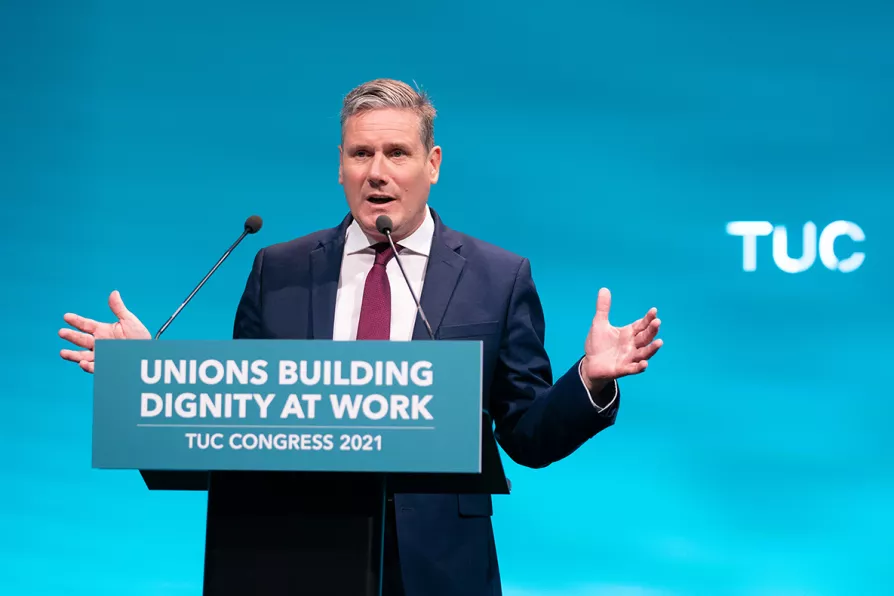
 Labour leader Sir Keir Starmer speaking at the TUC congress in London, September 14, 2021
Labour leader Sir Keir Starmer speaking at the TUC congress in London, September 14, 2021
DELEGATES at the first Trades Union Congress in 15 years under a Labour government sense an opportunity to reverse years of Tory attacks on working-class living standards.
Labour’s election has made a real difference. The summer’s public-sector pay settlements, the renationalisation of the railways and the repeal of anti-strike legislation all demonstrate that.
But TUC general secretary Paul Nowak rightly stresses that unions cannot sit back and expect Labour to deliver. Only a proactive, independent trade union strategy will ensure employment legislation is shaped in workers’ interests.
That is even truer when it comes to economic policy.
The far-right riots this summer were a wake-up call. On the face of it Keir Starmer understands that: addressing the country afterwards he said the Tories had left us in not just an economic, but a “societal black hole.”
Unfortunately he followed this up by prescribing more of the same policies which dug that hole. Short-term pain for long-term gain is something we’ve heard before: it was the mantra of the architects of austerity, David Cameron and George Osborne, who claimed their programme of cuts and privatisation would deliver a leaner, fitter and more resilient state.
The results have been a catastrophe, from our chronically understaffed NHS through our crumbling schools to run-down transport infrastructure.
We only need to look at the Covid pandemic to realise Cameron’s boasts were empty. Underfunding and understaffing, the latter directly linked to years of “pay restraint” amounting to a sharp decline in workers’ incomes, meant the NHS was declaring a “permanent winter crisis” even before Covid. The refusal to invest in contingency planning meant NHS workers didn’t have the tools for the job when the virus struck, forcing them to put their lives at unnecessary risk.
Labour acknowledges this, so why imagine that further cuts can lead to anything other than further damage to public services which are already on their knees?
Already the austerity logic has seen Labour slash investment in a green transition, reject public ownership of water despite increasing environmental and health risks emerging from the sector’s mismanagement by private capital, cancel promised infrastructure upgrades and subsidies for ecologically friendly farming.
With an increasingly erratic climate and following a year in which devastating floods reduced British farmers’ output by a fifth, putting off investment in the future is the opposite of responsible.
And it’s ironic that political leaders, who insist we are in a cut-throat competition with China when that means spending more on weapons, see no problem in our failure to compete internationally in renewable technologies or modernised infrastructure, which are always somehow too expensive.
Different choices are available, as Unite’s Sharon Graham points out: raising taxes on runaway corporate profits and the obscene wealth of the super rich would be “tough choices” taken in the public interest, unlike Labour’s attack on pensioners.
If the labour movement can’t shift Labour from adherence to its crippling “fiscal rules,” it is hard to see how we can fill NHS vacancies, repair the schools estate or avert the slow-motion collapse of local government across Britain, which has already begun.
And if the economic rot continues, so too will the social rot. Labour’s landslide is built on sand, with the party winning half a million fewer votes this year than it did in 2019.
We have seen the ugly face of race hate on our streets this summer, and the maths tells us a recalibration of the right, an alliance between Reform UK and an increasingly extremist Tory Party, would be enough to deliver a very different election result in a few years’ time.
So Labour must use the time it has. Starmer and Rachel Reeves, trapped in Treasury orthodoxy, will not simply decide to do so.
Their hand needs to be forced by a united labour movement, rejecting the politics of permanent austerity and decline.














